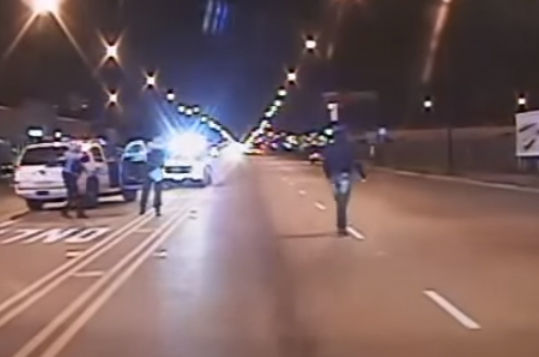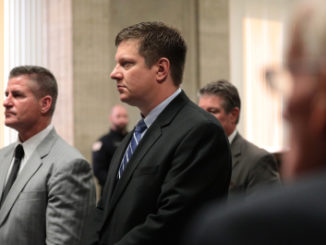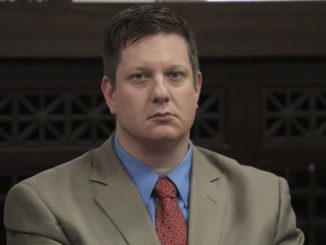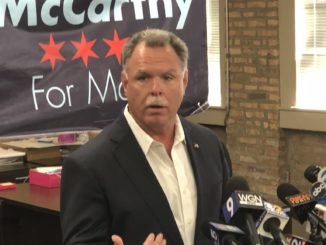
Khyle Hayes
Contributing Writer
10/16/18
When Jason Van Dyke arrived on the scene of Laquan McDonald’s murder, he was there for all of six seconds before he began to shoot.
In six seconds, it is impossible to fully survey the scene to diagnose what the next course of action should be. When Van Dyke arrived on the scene, McDonald was walking away from all of the officers with a street-legal 3-inch knife. We’ve all been taught never to bring a knife to a gun fight, but McDonald wasn’t in a gunfight. In fact, he was the only person present without a gun. The fact that his 3-inch knife was seen as a threat to multiple officers who had guns baffles me. In fact, it probably baffles some of the other officers who were on the scene, as when Van Dyke arrived, other officers hadn’t even had their weapons drawn.
In the six seconds that Van Dyke was on-scene before his shooting began, he didn’t even take time to ask fellow officers what their next step in handling the situation was. The only information he was able to get was that there was a black man with a knife. His 3-inch knife, which was being held 10 feet away, couldn’t logically make anyone a threat to someone who was trained and equipped to use their weapon if necessary. So, what could make a 17 year old teen without a gun a threat to the police? Well, Laquan McDonald’s black skin is the most convincing threat of them all.
Whether a man or a woman, a girl or a boy, or none of the above, armed or unarmed, though usually unarmed, the only similarity between cases like Laquan McDonald’s or Rekia Boyd’s is a white officer and a black victim. There must be something about the perception of a black victim that is attractive to the offender, guilty to the justice system, and worthless to the general public.
This horrendous perception of black people exists because when we are victimized, we are blamed for it. In the murder case of Laquan McDonald, it often feels as if Laquan McDonald is on trial himself. Blackness is damning. We can never be the victim. If something bad happens to us, it was our fault, we could’ve prevented it, and the world goes on. The world goes on so easily because we deserved it, because it must have been only actions of our own that got us there. This is why the Police Department falsified a toxicology report to say Laquan McDonald was high at the time of his murder. He wasn’t. This is why the defense constantly talks about Laquan’s legal 3-inch knife, which obviously didn’t have the potential to do real harm to the officers. This perception of black people goes beyond negative police interaction. It also applies the same way in the classrooms at Dominican University, but most of all, this perception allows the beholder to turn a blind eye to oppressive actions.
The same way Van Dyke’s defense is trying to convince you that Laquan McDonald doesn’t deserve sympathy or compassion, is the same way that we all have been convinced that black students don’t deserve any sympathy or compassion. We need black educations to be a priority, at least until the playing field is leveled from the past million years of keeping the negro out of books.
Much too often, black students struggle. Much too often, black students don’t feel comfortable reaching out for help and struggle their way out of school. Black students don’t feel comfortable reaching out for help because when they need help, instead of being offered adequate assistance, we’re treated as if we wouldn’t be in this position and need assistance if we’d just done better. Do better. Work twice as hard to be twice as good, to get half as much. Climbing out of the case of oppression that has existed for centuries and reaching this point is an accomplishment in itself. We crawled through bushes and still smell like roses and instead of being praised for it, we’re just given more bushes to crawl through.
If we need an extension from a professor, we should’ve started earlier. If we need to postpone a test, we’re told we don’t prioritize school. We’re treated as if we aren’t prepared even if we disclose a scheduling conflict. We’re constantly reminded that we’re not supposed to be here, and professors love to fit our normal college struggles into their narrative of inadequate black students. America loves to fit our plight and demise into its narrative into delinquent black citizens who need to be civilized or deserve what they get. We’re blamed and blamed and blamed again for everything that happens adversely to us as if the links back to slavery don’t exist, instead of being offered resources. We need to be offered resources. This sentiment is often confused with us asking for extra help, and we’re not. We’re only asking not to be held back.
Black people’s fight for equality and true freedom is far from over, and we can’t change it on our campus alone, but we can make our University’s black students feel like this University is where they are supposed to be. We can make this University’s black students comfortable, even when they are the only black student in the class. We can incorporate inclusive teaching methods so everyone feels that they belong. We can celebrate our black students without them having to put together everything themselves. We can take a clear stand against racism and bias instead of showing tolerance as if there are good people on both sides, and then maybe avoid statements like All Lives Matter. Most importantly, we can fail. Each failure is just the next step to success, but overall it shows an honest effort. We need effort, and if everyone puts in effort together, we can reach a point where no more black people have to die and inspire letters like this one.
hayekhyl@my.dom.edu



